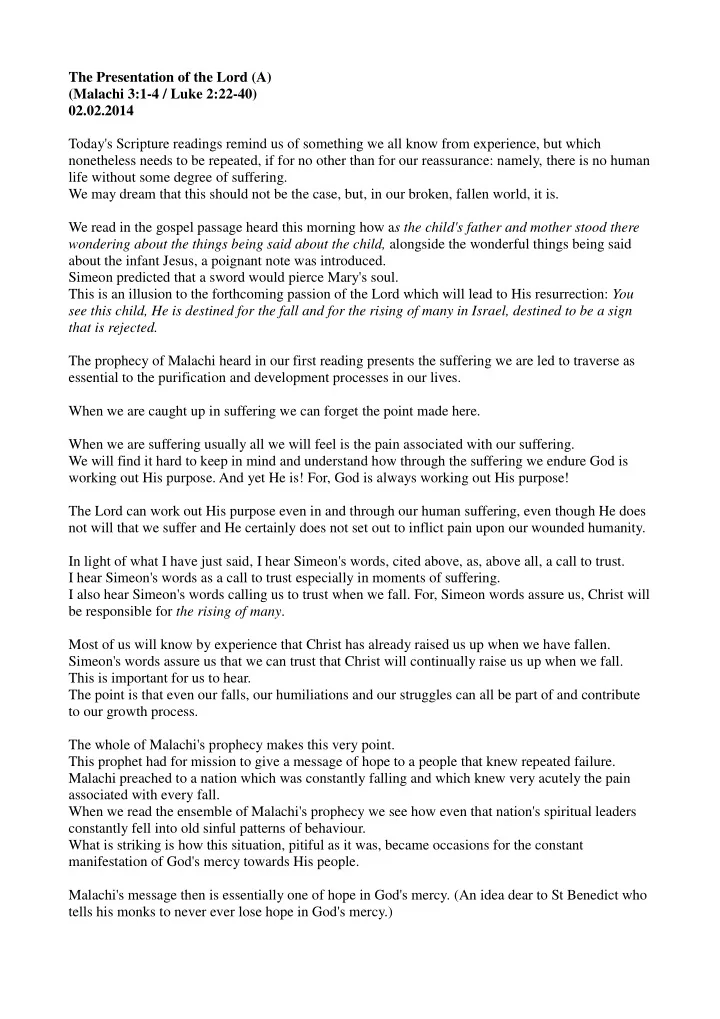

The Presentation of the Lord (A) (Malachi 3:1-4 / Luke 2:22-40) 02.02.2014 Today's Scripture readings remind us of something we all know from experience, but which nonetheless needs to be repeated, if for no other than for our reassurance: namely, there is no human life without some degree of suffering. We may dream that this should not be the case, but, in our broken, fallen world, it is. We read in the gospel passage heard this morning how a s the child's father and mother stood there wondering about the things being said about the child, alongside the wonderful things being said about the infant Jesus, a poignant note was introduced. Simeon predicted that a sword would pierce Mary's soul. This is an illusion to the forthcoming passion of the Lord which will lead to His resurrection: You see this child, He is destined for the fall and for the rising of many in Israel, destined to be a sign that is rejected. The prophecy of Malachi heard in our first reading presents the suffering we are led to traverse as essential to the purification and development processes in our lives. When we are caught up in suffering we can forget the point made here. When we are suffering usually all we will feel is the pain associated with our suffering. We will find it hard to keep in mind and understand how through the suffering we endure God is working out His purpose. And yet He is! For, God is always working out His purpose! The Lord can work out His purpose even in and through our human suffering, even though He does not will that we suffer and He certainly does not set out to inflict pain upon our wounded humanity. In light of what I have just said, I hear Simeon's words, cited above, as, above all, a call to trust. I hear Simeon's words as a call to trust especially in moments of suffering. I also hear Simeon's words calling us to trust when we fall. For, Simeon words assure us, Christ will be responsible for the rising of many . Most of us will know by experience that Christ has already raised us up when we have fallen. Simeon's words assure us that we can trust that Christ will continually raise us up when we fall. This is important for us to hear. The point is that even our falls, our humiliations and our struggles can all be part of and contribute to our growth process. The whole of Malachi's prophecy makes this very point. This prophet had for mission to give a message of hope to a people that knew repeated failure. Malachi preached to a nation which was constantly falling and which knew very acutely the pain associated with every fall. When we read the ensemble of Malachi's prophecy we see how even that nation's spiritual leaders constantly fell into old sinful patterns of behaviour. What is striking is how this situation, pitiful as it was, became occasions for the constant manifestation of God's mercy towards His people. Malachi's message then is essentially one of hope in God's mercy. (An idea dear to St Benedict who tells his monks to never ever lose hope in God's mercy.)
I see this message of hope in God's mercy to be as relevant for us today as it was for Israel in time past. I read it as a call addressed to us to present ourselves to the Lord anew this morning with hope in our hearts for a fresh start with Christ. I hear us called through today's feast to present ourselves to the Lord with our weaknesses, our faults, our flaws, our constant failures and falls, believing that, just as we are, the Lord comes to us. He comes to purify, heal and restore us. Presentation and Purification for together. Today's feast of the Presentation of the Lord is also referred to as the Purification of the Blessed Virgin Mary. Our presentation of ourselves before the Lord, just as we are, wins for us the purification of our hearts by God's grace. With hearts restored we can start out afresh with Christ. In the short text from Malachi we heard this morning, the prophet makes the point that precious metals are purified/refined by the searing heat of the furnace, while filthy fabric is cleansed by fullers' alkali (laundry soap/detergent of the time: water mixed with caustic soap). The point I see this prophetic message make is that God sometimes (maybe even often) uses the heat of fire and/or the bleaching we endure at different times in our lives to purify and refine our hearts, to recreate them, as He renews us in His service. Another way of putting that would be to say that God uses our share in Christ's sufferings to lead us with Christ ever further and deeper into God's own life.(Again this is an idea developed by St Benedict in his Rule for Monks. It is something Benedict draws special attention to in the Prologue of the Rule.) If our Orthodox brothers and sisters call today's feast The Encounter (referring to the encounter between God and His people), I see it as being especially about God's encounter with broken humanity. But it is not only that. It is also wounded humanity's encounter with God! It is as our broken hearts are presented to the Lord of life that they are healed and restored by Him. We are made whole by God's grace. The Messiah whom Simeon hails in the child Jesus is none other than the suffering servant of whom Isaiah spoke. Jesus is the servant who makes Himself one with the suffering of all humanity so that broken humanity might come to know the restoration of life Jesus' coming into the world brings to all humankind. Amen!
Recommend
More recommend